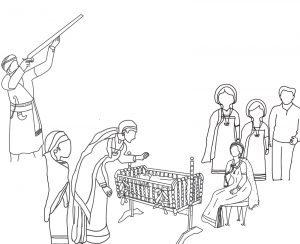Pedha idduve padhathi

One of the padathis in the kodava customs.
Pedha idduve padhathi – The Naming Ceremony
About
From way back, there was a practice of naming the baby within 12 days following its birth. For all these 12 days the baby will be put on a plaited round mat made of bamboo. Before naming ceremony, Nellakki bolcha is lit and prayed for the blessings of Igguthappa, Kaveramme, Gurukarana and few words are spoken by the men folks and the rights are given to the women folks to name the baby.
The birth of a child renders not only the mother of the new born baby, but the whole house unclean and everyone who may come in contact with them. This ceremonial un-cleanness [Sutaka] lasts for 7 days, be the baby male or female. The mother is confined for 2 months to the house and not expected to engage in any work, but to recover her strength and to devote herself entirely to her child. This singular custom no doubt greatly contributes to the general good health and vigor of the Coorg women. The girl child is brought up and yet are destined to be entirely alienated from the house by their marriage. Boys are the stay of families. As soon as a Coorg boy is born, a little bow of a castor-oil-plant stick with an arrow, made of a leafstalk of the same plant, is put into his little hands, and a gun fired at the same time in the yard. He is thus, at taking his first breath, introduced into the world as a future huntsman and warrior. This ceremony, however, has almost lost its meaning and ceases to be generally observed. On the 12th day after birth, the child is laid into the cradle by the mother or grandmother, who on this occasion gives the name, which in many instances is both well- sounding and significant; thus for boys- Belliappa [silver-father], Ponnappa [gold- father], Mandanna [the brother of the village-green]; for girls-Puvakka [flower-sister], Muttakka [pearl-sister], Chinnawa[gold-mother].
Custom
Married women spreads the mat (Palmbu) and on top of the mat they spread a white sheet and places the cradle, decorated with jasmine flowers in the Nellakki Nadubaade. Either side of the cradle there will be “Mukkali”. The mother of the new born will wear a silk saree and the baby’s mother sits on one stool (Mukkali) and the grandmother sits on the other. A pounding stone is wrapped with a cloth and is placed beside the cradle. They carry the baby before naming it and with the help of two other married women the grandmother of the baby ties a black thread on the waist, wrist and ankle. White beaded thread (Paal mani) is tied around the neck of the baby. The Kajal is heated on the knife and applied to the mother and the baby. Under the pillow of the baby they keep a small knife and a bamboo stick.
The pounding stone is once placed inside the cradle and taken back by the mother and on the other side the lady carrying the baby puts the baby in the cradle and takes it back and this process is repeated thrice and for the third time the baby is put in the cradle and will not be taken out till the rituals are over. After this, the pounding stone is passed under the cradle and the lady beside the cradle takes it and places it inside the cradle, next to the baby’s feet. The grandmother of the baby names the baby by whispering the name thrice into baby’s ear and rocks the cradle thrice. If it is a baby boy, a bow and arrow (Symbolic of martial tradition of Kodavas) is placed on the baby’s hand by the grandfather. This custom was practiced earlier. After all these rituals, the people gathered for the ceremony will bless the baby by giving money and gifts and the cradle is carried by the babies uncle and placed inside the room.
For 40 to 50 days the pethavva is fed with food which cools the body (like udhu kanji, Menthe paysa). After the 50th day she is fed with laddoo made of sesame seeds and fed for rest of the days. After completing 60 days “Neer Edpo” ritual is headed.


Comments
Leave a comment!Login for Post Comment
Last posts